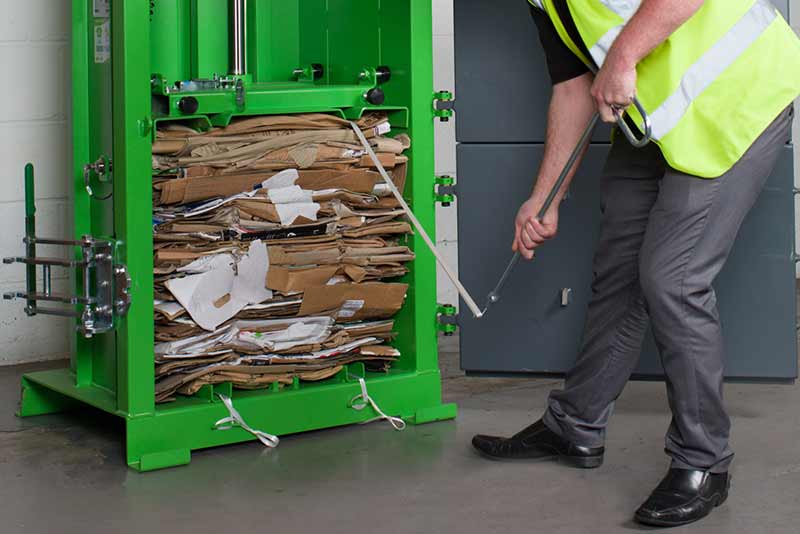Baling Wire: What Is It And How Can It Help You Manage Waste?

Effective waste management means constantly finding new ways
to improve practices to reduce waste as much as possible. There are many ways
to manage waste more effectively, including using waste balers to compact waste
into manageable bales so it can be collected and recycled as appropriate. But
even using waste balers leaves room for improvement in how you do things!
Baling wire is a simple yet essential tool for efficient
waste management. When you’re dealing with large amounts of waste, using baling
wire effectively can help you save both time and money, helping you secure your
waste and keep it manageable. But what exactly is baling wire and how can it be
used to improve your waste management? Learn all about the best uses of baling
wire in our latest blog post.
What is baling wire?
Baling wire is a strong, flexible wire used to secure
compressed materials into compact bales. It’s typically made from steel, it
comes in different types, including annealed, high-tensile, and galvanised
options, each suited for different baling needs. Its mainly used to hold
together recyclable materials like cardboard, paper, plastic, and scrap metal
for easier handling, storage, and transport.
What is baling wire used for?
Baling wire is widely used by businesses and organisations
that deal with volumes of waste. Some examples include:
- Recycling
facilities: Bundling paper, cardboard, plastics, and metals for collection.
- Warehouses
and retail: Managing packaging waste efficiently.
- Manufacturing:
Compressing waste materials for disposal or recycling.
It can also be used by any businesses that use waste baling to
manage their waste, this can include offices schools, food producers and more.
How can baling wire improve waste management?
Using baling wire has a lot of great uses to help you
improve your waste management processes. Some of the main benefits include:
Saves space
Compacting waste materials into dense bales helps businesses
significantly reduce the storage space required for waste before collection or
recycling.
Reduces disposal costs
Baled waste is easier to transport and requires fewer
collections, reducing waste disposal expenses and increasing the efficiency of
recycling operations. This can help save money, as well as reducing the volume
of waste generated by businesses and organisations.
How to use baling wire efficiently
Efficient use of baling wire ensures that your waste
management process remains cost-effective and safe. Here are some best
practices:
Choose the right type of baling wire
Selecting the correct baling wire for your materials is
crucial. High-tensile wire is best for heavy-duty applications like scrap
metal, while annealed wire is ideal for softer materials like paper and
cardboard.
Use the appropriate wire thickness
Thicker can help provide extra strength for heavier loads,
but it’s important to avoid using a wire that’s too thick when dealing with
lightweight materials as it can be wasteful and costly due to it not being
necessary.
Ensure proper tying techniques
Using the right tying method prevents bales from coming
apart during transport. Cross-tying or looping methods provide extra security
for large or irregularly shaped bales.
Maintain your baling equipment
Regular maintenance of waste balers and wire dispensers helps
keep your operations going and prevents costly downtime due to mechanical
issues.
Other ways to improve your waste baling practices
Beyond using baling wire, there are other ways you can improve
your waste management practices, including:
Invest in waste balers to compact waste
Waste balers are one of the most effective ways to compact
your waste and are suitable for use across a range of industries. From cardboard balers
to multi-chamber
balers, there are different baler types to suit different workplaces.
Train employees on best practices
Proper training ensures employees use baling equipment such
as baling wire safely and efficiently, reducing waste and improving
productivity.
Standardise bale sizes
Keeping bale sizes consistent helps optimise storage space
and simplifies logistics.
Invest in high-quality baling wire
Cheaper wire may break more easily, leading to wasted
materials and increased costs. Investing in high-quality wire reduces the risk
of failures and enhances efficiency.
Conduct regular waste audits
Tracking the amount and type of waste your business
generates can help you improve your waste management practices and find new
ways to reduce waste and improve recycling rates.
Effective waste baling with phs Wastekit
Waste baling is a great way to improve how you manage waste.
Using baling machines can help save your business time and money, while having
a more positive impact on the environment. Using baling wire can be a useful tool
for businesses managing significant amounts of waste, improving waste baling
practices and keeping spaces safe and organised.
phs Wastekit is a leading supplier of waste baling products
in the UK. We supply baling machines and compactors in different sizes to help
you manage different types of waste effectively and can provide valuable
training to help your employees use the equipment properly.
Find out more about waste management with phs Wastekit. Book
a free Waste Audit
and see how your business can adopt better practices that will not only improve
the way you manage waste, but help the environment too.
Baling wire is a strong, flexible wire used to secure compressed materials into compact bales. It’s typically made from steel, it comes in different types, including annealed, high-tensile, and galvanised options, each suited for different baling needs. Its mainly used to hold together recyclable materials like cardboard, paper, plastic, and scrap metal for easier handling, storage, and transport.
To find out more about how a waste baler can help you reduce your impact on the planet and enable you to make money from your recycling, contact phs Wastekit today.